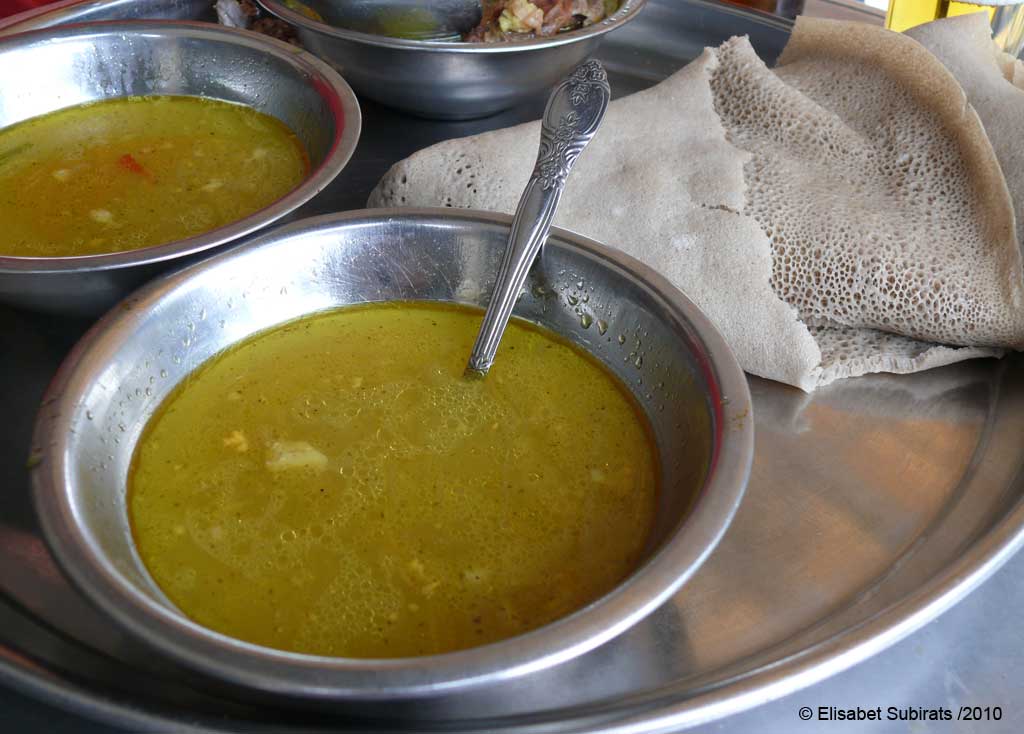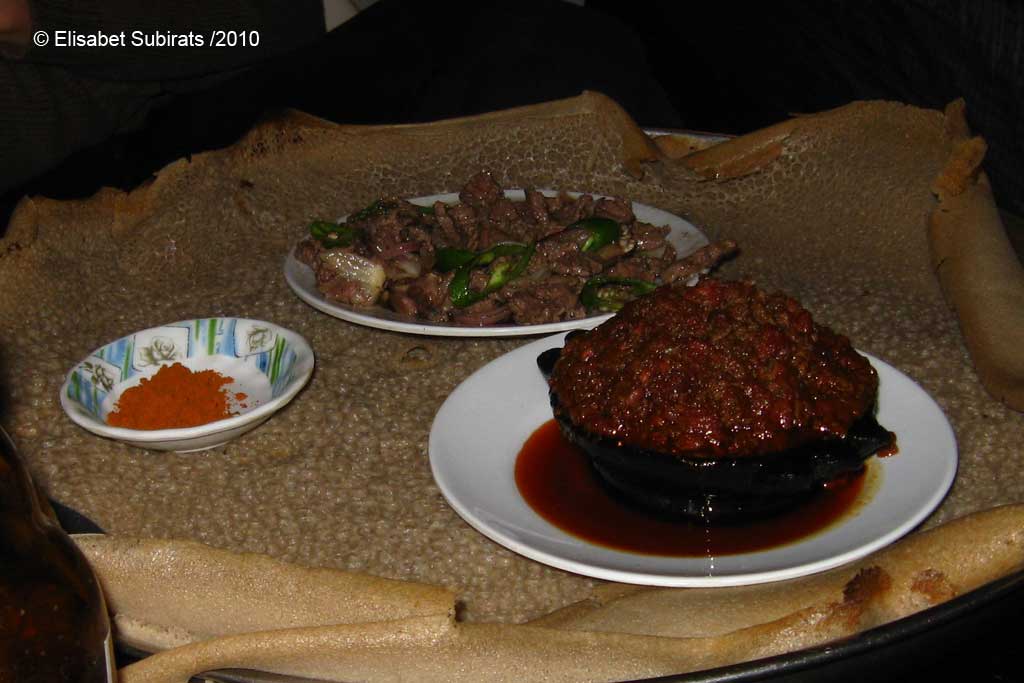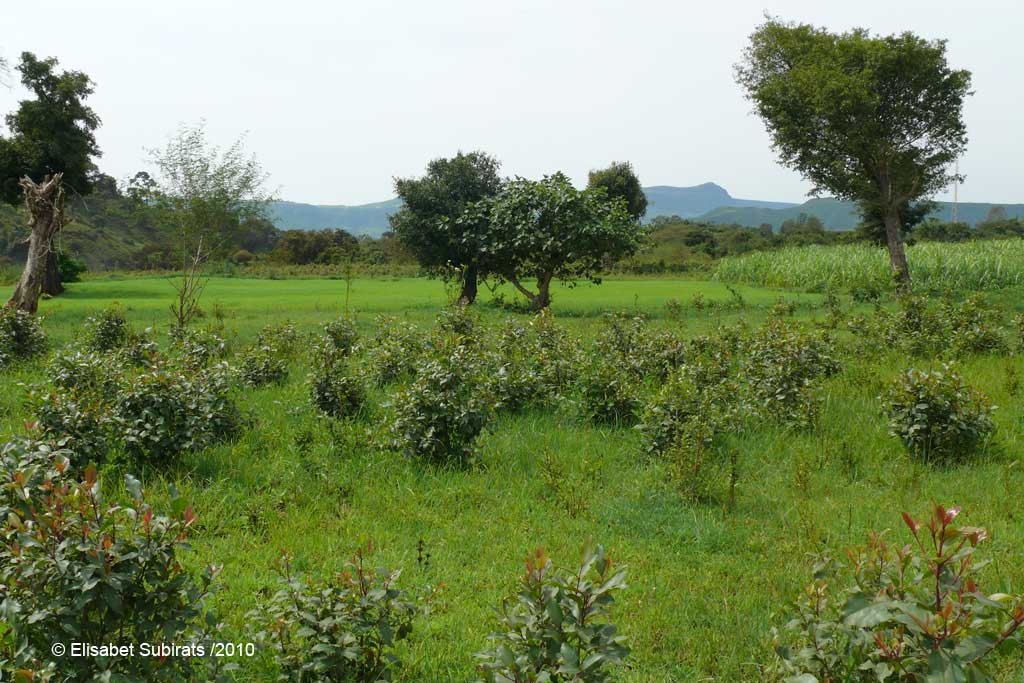Tejj is the basis of Ethiopia’s diet. With this cereal Ethiopians prepare the Injera, a kind of tort which you will find everywhere accompanying all kind of meat and vegetables. Maybe there are different ways to prepare it because depending on the area where I was, Injera’s color was darker. Texture is funny but it does not have a special taste so after few days eating the same I was bored and tried to find anywhere a dish of spaghetti with tomato sauce (which were not bad at all, Ethiopians cook spaghetti better than French!). Although Tejj is a very nutritious and complete cereal, Ethiopia is the only country that eats it.

Ethiopian Cuisine has many spicy meat dishes and meat tends to be raw so to avoid any travel illness it is a good idea to ask the cook to cook it more for you. Usually meat dishes are presented on a big plate covered by Injera. That’s your fork! Take a piece of Injera and use it to pick and eat the meat. Beer (bira or birra) is usually soft, my favourite one was S. George.

Ethiopia grows some of the Worlds Greatest Coffee, Arabica type, and coffee has always been one of the pillars of Ethiopian economy. However coffee production is threatened by the infamous chat (or qat). The flower of paradise, Allah’s gift . . . that’s how this stimulant is known by the chat consumers. Chewing the leaves of this small plant – Catha Edulis – releases people’s mind and it is very appreciated by poets and philosophers who use it as a source of inspiration. Nowadays people, especially in the south of the country, chew chat like an ecstasies which liberates their body and mind. They chew it in small groups, it is already a social activity and a kind of way to escape from the reality. In Harar, when sun goes down, many chat sellers appear to sell their fresh product.
Chat plantations already occupy almost all the cultivable land having displaced Ethiopian coffee. Chat’s cultivation is easier and produces more benefits. Coffee exports have been considerably reduced while tones and tones of chat leave the country daily to Djibuti and Yemen where it is known as qat. Unfortunately I saw many chat plantations but any coffee plantation 🙁
 Health consequences of chat consumption are insomnia, anorexia and men’s impotence.
Health consequences of chat consumption are insomnia, anorexia and men’s impotence.
In Ethiopia everything is different: food, a unique alphabet and even the calendar and time are different! Ethiopians have a 13 months calendar instead of 12, that’s why they use as slogan “Ethiopia: 13 months of sun”. Their end of the year corresponds to our 10th of September and, like us, they celebrate it with big parties. The Ethiopian Calendar is 8 years behind the Gregorian Calendar because for them the origin of Christian Era started with Jesus’ Incarnation (on 25th March year 9 on Julian’s Calendar) so when I was there in 2010 I celebrated the beginning of 2002 🙂
I found the way they calculate time much more tricky: in Ethiopia there are almost regularly 12 day hours and 12 night hours so their first hour corresponds to the first day hour (about 6am). If you have a meeting in Ethiopia, at 2 for example, it would be wise to ask if it’s Western time (2pm) or Ethiopian (7am) time! Lunch time is always at 7 😉
Disclaimer: This post includes affiliate links, meaning I get a small commission if you make a purchase through our links. It costs you nothing more (in fact, if anything, you’ll get a nice discount) but helps me to go on creating incredible Barcelona content for you. I trust all products promoted here and would never recommend a product that isn’t of value.
World Trip Planner is a participant in the Amazon Services LLC Associates Program. As an Amazon Associate, I earn from qualifying purchases at no expense to you.
About WORLD TRIP PLANNER
Quirky explorer with a preference for lesser-known sights, I am continuously looking for new ideas and tips to help you plan your dream World Tour!


 Health consequences of chat consumption are insomnia, anorexia and men’s impotence.
Health consequences of chat consumption are insomnia, anorexia and men’s impotence.
